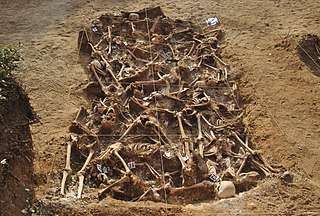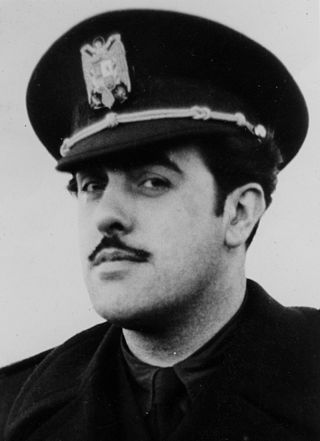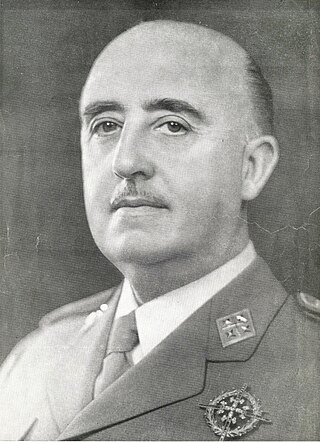
The Catalan independence movement is a social and political movement which seeks the independence of Catalonia from Spain.

The Spanish transition to democracy, known in Spain as la Transición or la Transición española, is a period of modern Spanish history encompassing the regime change that moved from the Francoist dictatorship to the consolidation of a parliamentary system, in the form of constitutional monarchy under Juan Carlos I.
The Durruti Column, with about 6,000 people, was the largest anarchist column formed during the Spanish Civil War. During the first months of the war, it became the most recognized and popular military organisation fighting against Franco, and it is a symbol of the Spanish anarchist movement and its struggle to create an egalitarian society with elements of individualism and collectivism. The column included people from all over the world. Philosopher Simone Weil fought alongside Buenaventura Durruti in the Durruti Column, and her memories and experiences from the war can be found in her book, Écrits historiques et politiques. The Durruti Column was militarised in 1937, becoming part of the 26th Division on 28 April.

In the history of Spain, the White Terror describes the political repression, including executions and rapes, which were carried out by the Nationalist faction during the Spanish Civil War (1936–1939), as well as during the following years of the regime of General Francisco Franco. In the 1936–1975 period, Francoist Spain had many officially designated enemies: Loyalists to the Second Spanish Republic (1931–1939), Liberals, socialists of different stripes, Protestants, intellectuals, homosexual people, Freemasons, Romanis, Jews, Black people, immigrants, Basque, Catalan, Andalusian and Galician nationalists.

José Antonio Girón de Velasco was a prominent Spanish Falangist politician. He was minister of Labor (1941–57), counselor of the Council of the Realm and member of the Cortes Españolas. He was one of the most heard voices against any kind of changes during the last years of Francoist regime, taking part in the political group known as "the Bunker", for their reluctance to the Spanish transition to democracy after Franco's death.

The Canadenca strike was a historic strike action in Barcelona, Catalonia, Spain, that was initiated in February 1919 by Confederación Nacional del Trabajo (CNT) and lasted over 44 days evolving into a general strike paralyzing much of the industry of Catalonia. Among its consequences was to force the Spanish government to issue the Decreto de la jornada de ocho horas de trabajo, the first law limiting the working day to eight hours. The strike originated at the principal electricity company in Barcelona, Riegos y Fuerzas del Ebro, a subsidiary of Barcelona Traction, popularly known as la Canadenca because its major shareholder was the Canadian Bank of Commerce of Toronto.

¡Democracia Real YA!, also known as Plataforma Democracia Real Ya!, is a Spanish grassroots organization that started in March 2011 in Madrid, Spain. It sparked the political movement of May 15, 2011 (15M) whose protests gained worldwide attention. The protests been compared to the May 1968 social movement in France.
Catalan Federation of the PSOE or Catalan Socialist Federation was a political party in Catalonia, Spain. The FSC first groups emerged between 1880 and 1882.
An independence referendum was held on 1 October 2017 in the Spanish autonomous community of Catalonia, passed by the Parliament of Catalonia as the Law on the Referendum on Self-determination of Catalonia and called by the Generalitat de Catalunya. The referendum, known in the Spanish media by the numeronym 1-O, was declared unconstitutional on 7 September 2017 and suspended by the Constitutional Court of Spain after a request from the Spanish government, who declared it a breach of the Spanish Constitution. Additionally, in early September the High Court of Justice of Catalonia had issued orders to the police to try to prevent the unconstitutional referendum, including the detention of various persons responsible for its preparation. Due to alleged irregularities during the voting process, as well as the use of force by the National Police Corps and Civil Guard, international observers invited by the Generalitat declared that the referendum failed to meet the minimum international standards for elections.

Sociological Francoism is an expression used in Spain which attests to the social characteristics typical of Francoism that survived in Spanish society after the death of Francisco Franco in 1975 and continue to the present day.

Francoism in Catalonia was established within Francoist Spain between 1939 and 1975, following the Spanish Civil War and post-war Francoist repression. Francisco Franco's regime replaced Revolutionary Catalonia after the Catalonia Offensive at the end of the war. The dictatorship in Catalonia complemented the suppression of democratic freedoms with the repression of Catalan culture. Its totalitarian character and its unifying objectives meant the imposition of a single culture and a single language, Castillian. The regime was specifically anti-Catalan, but this did not stop the development of a Catalan Francoism that was forged during the war and fed by victory.
The Political-Social Brigade, officially the Social Investigation Brigade, was a secret police in Francoist Spain in charge of persecuting and repressing opposition movements. The brigade was a section of the General Police Corps (CGP). During the Spanish transition to democracy, it was restructured and replaced by the Central Information Brigade (BCI). Among the anti-Franco opposition, it was known colloquially as "the Social", "the Secret" or "the Brigade".

Women in Partido Comunista de España in Francoist Spain faced many challenges. Partido Comunista de España (PCE) had been made illegal by the new regime, which banned all political parties and trade unions. In the final days of the Civil War and during the first days of Francoist Spain, women were imprisoned just for being related to "reds". They were also investigated, harassed, imprisoned and executed for expressing sympathy for Republicans or belonging to any leftist organization. Many women in PCE were caught up in this. PCE women's organization Agrupación de Mujeres Antifascistas survived the war, and shifted their priorities to assisting political prisoners in Francost jails.

The mottos of Francoism are mottos which encapsulate the ideals of the Francoist dictatorship. Although the regime had many ideological influences, it employed Falangism in its popular movements. Falangist ideology was easily incorporated in the creation of mottos as it is believed to demonstrate a certain reluctance towards political agendas, and to favour empiricism, taking action, and the simplification of ideas.

The Sindicato Español Universitario was a corporatist students' union in Spain, created in the 1930s during the Second Spanish Republic, by the Falange Española under the leadership of José Antonio Primo de Rivera. The SEU was inspired by students' unions linked to contemporary fascist parties of Italy and Romania.

Licinio de la Fuente y de la Fuente was a Spanish Francoist politician who served as Minister of Labour from 1969 to 1975. Promoter of the Democracia Social party during the Spanish Transition, he was one of the "Magnificent Seven", the seven political leaders who founded the federation of People's Alliance (AP) in 1976.

Carlo-francoism was a branch of Carlism which actively engaged in the regime of Francisco Franco. Though mainstream Carlism retained an independent stand, many Carlist militants on their own assumed various roles in the Francoist system, e.g. as members of the FET y de las JONS executive, Cortes procuradores, or civil governors. The Traditionalist political faction of the Francoist regime issued from Carlism particularly held tight control over the Ministry of Justice. They have never formed an organized structure, their dynastical allegiances remained heterogeneous and their specific political objectives might have differed. Within the Francoist power strata, the carlo-francoists remained a minority faction that controlled some 5% of key posts; they failed to shape the regime and at best served as counter-balance to other groupings competing for power.

Destino was a Spanish weekly magazine published in Spain between 1937 and 1980, initially in Burgos and from 1939 in Barcelona.
Winds of the Night is a novel by the Catalan author and publisher, Joan Sales. It is set in a devastated and impoverished Catalonia under the heel of the Franco dictatorship after the Spanish Civil War. Its narrator is a Catholic priest who undergoes a major crisis of faith.
"Perhaps the worst of war is the peace that follows."

The visit of Nazi leader Heinrich Himmler to Spain in October 1940 had a major propaganda component for the Francoist regime, which at that time was invested in a diplomatic rapprochement with Nazi Germany with the anticipation of Spain's entry into World War II in support of the Axis powers. Himmler's stay in Spain took place between 19 and 24 October. It was one of the very few trips that the Nazi leader made to neutral countries.















